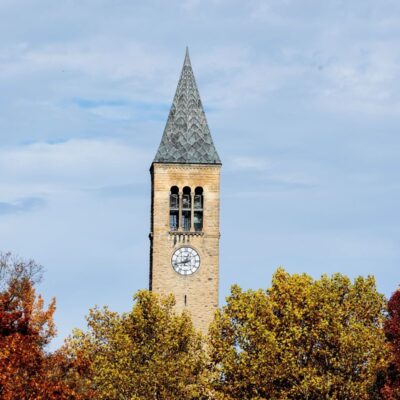Programs Support NSF GRFP Applicants

October 14, 2024
By Katya Hrichak
Thirty-six Cornell graduate students began this academic year as new National Science Foundation Graduate Research Fellowship Program (NSF GRFP) fellows as another round of NSF GRFP-focused Graduate School programming wrapped up. Many of this year’s new fellows credit these programs with helping them craft strong—and ultimately successful—proposals.
An NSF GRFP overview session offered students an opportunity to learn more about the fellowship and ask questions of students that are current GRFP fellows and a Cornell faculty member who has served as a GRFP reviewer. Two in-person peer review sessions allowed students to workshop their ideas and proposal drafts with other current GRFP fellows in their disciplines, as well as with tutors from the Graduate Writing Service. The Graduate School also offers prospective applicants access to a proposal library of past successful GRFP fellowship applications that former winners have shared as a resource for their peers.
“Being selected for the NSF GRFP is a significant achievement and it’s important that we support Cornell graduate students in preparing successful applications,” said Josephine Martell, associate dean for academics. “Offering this programming provides students important insight and feedback that help them submit competitive proposals.”
Several of this year’s new fellows found last year’s workshops to be an important part of their application preparation.
“The session offered a holistic perspective on what makes a competitive application—fellows shared not only their academic achievements but also how their experiences outside the classroom shaped their application,” said George Padilla, a materials science and engineering master’s student who attended last year’s overview. “I found it to be an engaging and helpful session with plenty of opportunities to ask questions.”
Elijah Sheridan, a doctoral student in physics, attended a peer review session last fall that helped him prepare his application.
“The opportunity to have a current NSF graduate fellow thoroughly review my application materials and provide detailed feedback was extremely valuable,” he said. “In particular, I was given insight into both the big picture of how to best tell the story of myself and my research and also the more technical aspects of how to optimize essay formatting and organization to meet the NSF’s criteria and preferences.”
NSF offers approximately 2,000 fellowships per year to research-based master’s and doctoral students pursuing study in NSF-supported science, technology, engineering, and math disciplines at accredited institutions with a campus located in the U.S., its territories, possessions, or the Commonwealth of Puerto Rico.
As part of the five-year fellowship, students receive three years of financial support, including an annual stipend of $37,000, and access to professional development opportunities. Fellows’ institutions receive a cost of education allowance of $16,000.
“This fellowship, unique among most funding opportunities, allows a great deal of flexibility in the topic of research which I can now pursue. As many can attest, graduate school is an unpredictable time; embracing unexpected results can mean the difference between projects evolving in a new direction versus petering out,” said Lilijana Oliver, a doctoral student in plant biology who was recently awarded a fellowship. “The flexibility of the NSF GRFP enables adaptability and confidence toward pursuing my research topics of interest.”
Selection for the NSF GRFP also provides other benefits, such as networking opportunities and internships, which Padilla looks forward to, and financial support to travel for research collaborations as well as the freedom to customize one’s career trajectory, which Sheridan looks forward to.
“Being awarded the NSF GRF is an incredible honor,” said Padilla. “Not only does it support my own scientific inquiry, but it also empowers me to be a source of visibility and advocacy for others. Receiving this fellowship felt like a green light in my journey as a scientist, affirming that I’m on the right—though sometimes labyrinthine—path.”
The new 36 fellows join a community of 230 Cornell NSF GRFP fellows.
